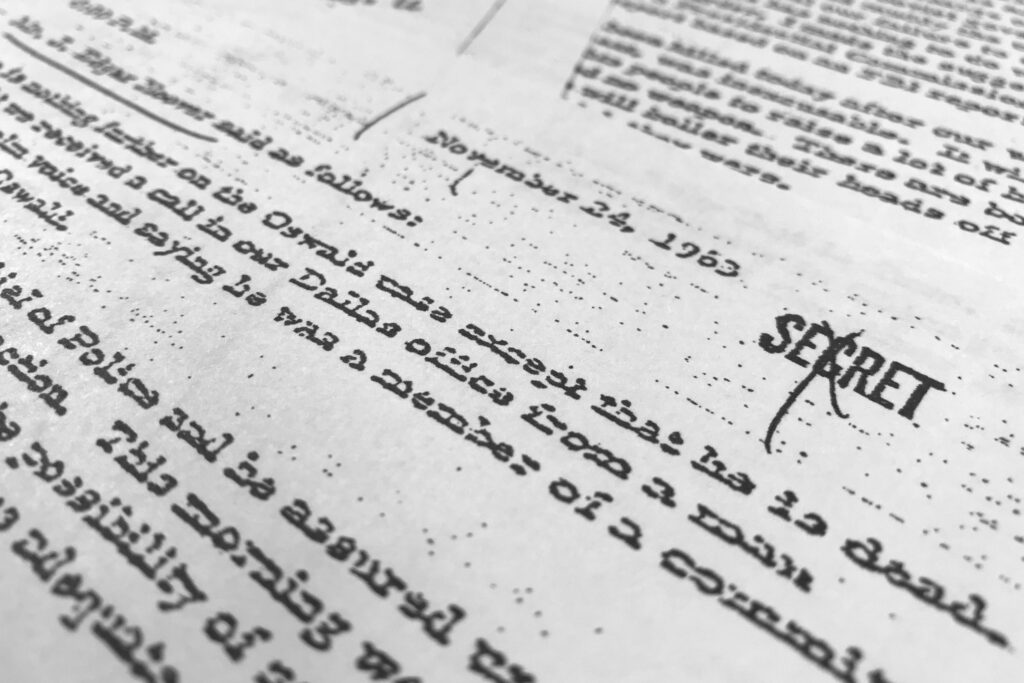This commentary comes from Robert Reynolds, a professor at Chi Nan University in Taiwan, via Max Holland’s Washington Decoded site. Since Reynolds mentions my work in his commentary I thought I would introduce him and his work to readers of JFK Facts. Reynolds is part of a diverse listserve of JFK authors and researchers managed by emeritus researcher Paul Hoch. Reynold’s criticism, though I disagreed with it, forced me to clarify my thinking about the last of the JFK files. Here is how Reynolds introduced himself to our group, followed by some highlights of his Washington Decoded piece.
I have responded to Reynolds in a separate post, “JFK Most Wanted: Three Key CIA Files That Need to Be Declassified.”
I’m a professor in the Department of Foreign Languages at Chi Nan University in Taiwan. My interest in the JFK assassination really started with the 2017 releases of JFK ARC [Assassination Records Collection] records at NARA. I couldn’t make head or tail of the coverage, and wound up downloading every installment of the releases and writing up notes on my blog at rgr-cyt.org, which I usually use to write miscellaneous research notes and short posts to my students. After a couple of years of this, I moved my notes over to a new site called jfkarc.info. I have about eighty to ninety posts up now, most of them short and boring. A few are long and really boring.
Almost all of my writing is on the JFK ARC, as a collection and as individual documents, rather than on the complex forensic details of the assassination. I have been especially interested in the problems and procedures of declassification, since so many of the documents I looked at had strange looking and often inconsistent redactions. Most of my recent notes are related to the updated JFK database, which I have been using to track down the remaining redacted documents in the collection. Will my hobby come to an end in 2022? Time will tell.”
Here are few of the more provocative passages in Reynolds’ Washington Decoded piece:
It bears pointing out that all of these withheld-in-full records have been examined by at least three sets of investigators: the Warren Commission in 1964, the House Select Committee on Assassinations in the late 1970s, and most recently, the ARRB. But if continuing to keep these documents closed convinces one that JFK’s death must have been a conspiracy, or that one has to be able to see these documents before one can decide whether there was a conspiracy, there was really no reason to wait until now to decide. The decision to withhold these documents was made 29 years ago, when the JFK Act became Public Law 102-526 in 1992.
The most important point to keep in mind, of course, is whether release of any or all of these longer redactions will enhance historical understanding of JFK’s assassination. Is it possible these deletions will significantly change what we know (or think we know) about the event? The answer is a resounding no.
In the first place, the ARRB would have insisted on making the information public during its tenure. All of the board members considered that their prime directive under the JFK Act, even if it wasn’t spelled out precisely in those terms. To believe that the review board consciously sat on documents that fundamentally challenge the official story (i.e., the Warren Report) is to misunderstand completely the animating purpose of not only the five Senate-confirmed board members, but the entire ARRB staff.
…
In a November 2021 op-ed for the Miami Herald, Jefferson Morley, a former Washington Post journalist, cited this file as an instance where “If and when they are released, these pages may shed light on the CIA cover-up that followed JFK’s murder.” This assertion makes no sense. The still-withheld pages are part of a 15-page attachment to a dispatch that JMWAVE, the CIA station in Miami, sent to Washington headquarters in November 1965. The letter describing the attachment states, “Forwarded under separate cover is a list of political prisoners in Cuban jails. The list was compiled by the AMSPELL organization and contains the names and addresses of relatives who are living in the United States.”
The attachment itself consists of two parts. The first section lists prisoners with their names redacted but with other information about them intact, including the date they were detained (Detención); what looks to be the legal statutes they were charged with violating (Causa); the length of their sentences (Años); and the provinces where they were arrested or are imprisoned (Provincia). It is a long list, with sentences ranging from one to 30 years.
The other section of the attachment is entirely withheld but the form of the text is preserved, and it is also clearly a list. Based on the cover letter, this list must have provided the names and addresses of the prisoners’ relatives in the United States. It defies credulity to see how “these pages may shed light on the CIA cover-up [sic] that followed JFK’s murder.”
…
Morley essentially argues that proof of the CIA’s complicity in the assassination resides in the mere fact that some CIA records gathered under the JFK Act are still redacted. Not true, and one need not wait for new releases to verify this. The context and nature of current redactions makes it clear just how little historically-significant information is still being withheld. Look for yourself.
Morley responds: “JFK Most Wanted: Three Key CIA Files That Need to be Declassified.”


